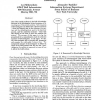Free Online Productivity Tools
i2Speak
i2Symbol
i2OCR
iTex2Img
iWeb2Print
iWeb2Shot
i2Type
iPdf2Split
iPdf2Merge
i2Bopomofo
i2Arabic
i2Style
i2Image
i2PDF
iLatex2Rtf
Sci2ools
107
click to vote
KDD
1995
ACM
1995
ACM
On Subjective Measures of Interestingness in Knowledge Discovery
One of the central problems in the field of knowledge discovery is the development of good measures of interestingness of discovered patterns. Such measures of interestingness are divided into objective measures - those that depend only on the structure of a pattern and the underlying data used in the discovery process, and the subjective measures - those that also depend on the class of users who examine the pattern. The purpose of this paper is to lay the groundwork for a comprehensive study of subjective measures of interestingness. In the paper, we classify these measures into actionable and unexpected, and examine the relationship between them. The unexpected measure of interestingness is defined in terms of the belief system that the user has. Interestingness of a pattern is expressed in terms of how it affects the belief system.
Related Content
| Added | 26 Aug 2010 |
| Updated | 26 Aug 2010 |
| Type | Conference |
| Year | 1995 |
| Where | KDD |
| Authors | Abraham Silberschatz, Alexander Tuzhilin |
Comments (0)

